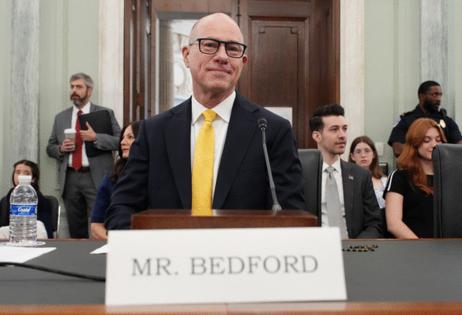FAA nominee Bedford defends pilot training rule position
Published in News & Features
WASHINGTON — Bryan Bedford, the nominee to lead the Federal Aviation Administration, attempted to reassure Democrats that he would uphold safety standards despite his record lobbying against tougher pilot training rules.
Bedford, a career airline executive, told the Senate Commerce Committee on Wednesday that he supports “structured” pilot training programs as well as a rule requiring pilots to log 1,500 hours of flying time before operating a commercial flight. He said in the past that the 1,500-hour rule wrongly focused on the quantity, rather than the quality, of training.
“I’ve been a supporter of 1,500 hours, contrary to what some of the press might say, because it did require structured training … that requires at least another 30 hours of classroom curriculum, requires at least another 10 hours of advanced flight simulation training and requires successful completion of a written exam and a multi-engine check ride,” Bedford said during the hearing. “So there, I am a big supporter of structured training as opposed to pure time … and, for the record, the FAA agrees.”
Bedford has been the president and CEO of Republic Airways Inc. since 1999. He had previous positions as the chairman of the Regional Airline Association board, president and CEO of regional airlines Mesaba Airlines Inc. and Business Express Airlines Inc., and worked at Phoenix Airline Services, West Air and Aspen Airways.
Republic Airways launched a pilot training program in 2018 called LIFT Academy, which has become one of the nation’s largest flight academies. The airline also applied for an exemption from the 1500-hour rule, a request the FAA denied in 2022.
Bedford fielded questions from Senate Commerce ranking member Maria Cantwell, D-Wash., and Aviation Subcommittee ranking member Tammy Duckworth, D-Ill., about whether he would change the 1,500-hour rule as FAA administrator.
“We both want to have the safest pilots operating our aircraft,” Bedford said in an exchange with Duckworth.
“But you’re not answering,” Duckworth said. “I mean, it doesn’t sound like a ‘yes.’ It sounds like you’re leaving the door open to reduce the number of flight hours.”
“I can’t commit to things that I don’t know, but I can commit to you that we will not have anything that would reduce safety,” Bedford said.
Bedford also told Cantwell and Duckworth that his priority would be to oversee a White House plan to overhaul the air traffic control system.
“Together, we can design and build a new system which will allow the emergence of new technologies such as drones and advanced air mobility aircraft to be safely introduced into our NAS and to usher in a new era of innovation and opportunity for American aviation,” Bedford said, referring to the National Airspace System.
Sen. Marsha Blackburn, R-Tenn., asked about efforts to raise the pilot retirement age from 65 — an issue that in part stalled negotiations on the previous FAA reauthorization bill. Bedford said that an “arbitrary” retirement age didn’t seem “like the right answer.”
“We successfully accomplished that by moving from 60 to 65, and I think it’s absolutely possible to accomplish that in a reasonable period of time,” Bedford said.
©2025 CQ-Roll Call, Inc., All Rights Reserved. Visit cqrollcall.com. Distributed by Tribune Content Agency, LLC.







Comments